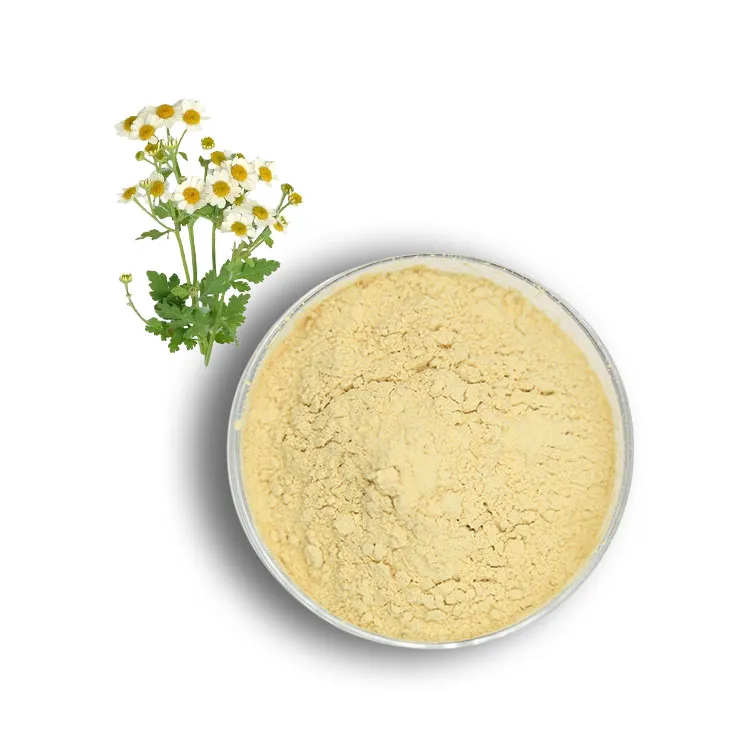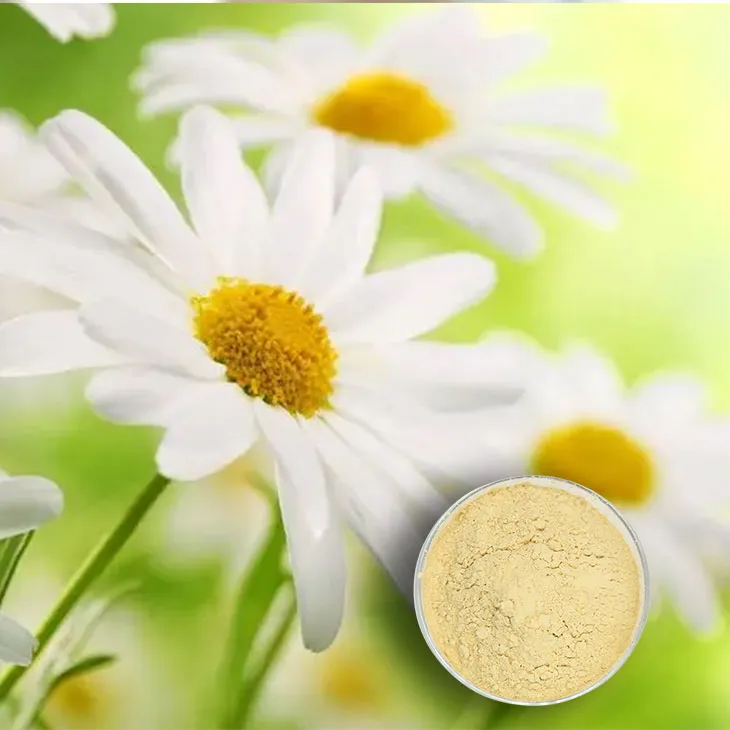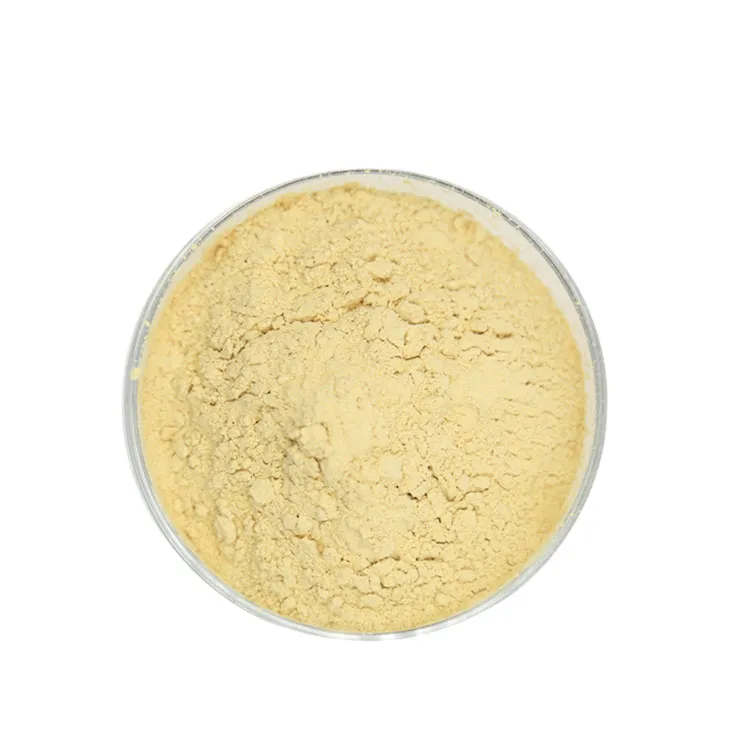- 0086-571-85302990
- sales@greenskybio.com
The best feverfew extract in nature.
2024-11-29

Introduction to Feverfew
Feverfew (Tanacetum parthenium) is a plant that has been known for centuries for its potential medicinal properties. It is a herbaceous perennial plant, native to southeastern Europe and Asia Minor. The plant is characterized by its small, white, daisy - like flowers and fern - like leaves. Feverfew has a long history of use in traditional medicine, and today, its extract is being studied extensively for various health - related applications.

Bioactive Compounds in Feverfew Extract
Feverfew Extract contains a variety of bioactive compounds that are responsible for its potential health benefits. One of the most important compounds is parthenolide. Parthenolide is a sesquiterpene lactone, which has been the focus of much research due to its biological activities. It is believed to play a significant role in the anti - inflammatory and analgesic (pain - relieving) effects of feverfew.
In addition to parthenolide, Feverfew Extract also contains flavonoids, such as apigenin and luteolin. Flavonoids are known for their antioxidant properties. They can scavenge free radicals in the body, which are unstable molecules that can cause damage to cells. The presence of these flavonoids in feverfew extract contributes to its overall antioxidant activity, protecting the body from oxidative stress.
Other compounds in feverfew extract include essential oils, which may also have antimicrobial and anti - inflammatory properties. These essential oils give feverfew its characteristic smell and may play a role in its traditional uses as a medicinal herb.

Potential Health Benefits of Feverfew Extract
1. Migraine Relief
One of the most well - known potential benefits of feverfew extract is in the treatment of migraines. Migraines are a type of severe headache that can be accompanied by symptoms such as nausea, vomiting, and sensitivity to light and sound. Some studies have suggested that feverfew extract may help to reduce the frequency and intensity of migraines.
The exact mechanism by which feverfew works to relieve migraines is not fully understood. However, it is thought that parthenolide, the main bioactive compound in feverfew, may act on blood vessels in the brain. It could potentially reduce the inflammation of blood vessels that is often associated with migraines. Additionally, feverfew may also affect neurotransmitters in the brain, which play a role in pain perception.
Clinical trials have shown some promising results. For example, in some studies, patients who took feverfew extract reported a decrease in the number of migraine attacks over a period of time. However, more research is needed to confirm these findings and to determine the optimal dosage and formulation of feverfew for migraine treatment.
2. Anti - Inflammatory Effects
Feverfew extract has significant anti - inflammatory properties. Inflammation is a natural response of the body to injury or infection, but chronic inflammation can be harmful and is associated with many diseases, such as arthritis, heart disease, and cancer.
The parthenolide in feverfew extract has been shown to inhibit the production of inflammatory mediators in the body. These inflammatory mediators, such as cytokines and prostaglandins, are chemicals that are released by cells in response to injury or infection and can cause inflammation. By inhibiting their production, feverfew extract can help to reduce inflammation in the body.
Animal studies have demonstrated the anti - inflammatory effects of feverfew. For example, in some experiments, rats treated with feverfew extract showed reduced inflammation in their joints compared to control rats. These results suggest that feverfew may have potential applications in the treatment of inflammatory diseases, although further human studies are required.
3. Antioxidant Activity
As mentioned earlier, feverfew extract contains flavonoids and other compounds with antioxidant properties. Antioxidants are important for maintaining the health of cells in the body. They protect cells from oxidative damage, which is caused by free radicals.
Oxidative damage can lead to a variety of health problems, including aging, cancer, and neurodegenerative diseases. By scavenging free radicals, feverfew extract can help to prevent this damage. In vitro studies have shown that feverfew extract can effectively neutralize free radicals, and some in vivo studies in animals have also suggested that it may have antioxidant effects in the body.
However, more research is needed to fully understand the antioxidant potential of feverfew extract in humans and to determine how it can be used to promote health and prevent disease.

How to Use Feverfew Extract
Feverfew extract can be used in several forms. It is available as a dietary supplement in the form of capsules, tablets, or tinctures. When using feverfew extract as a supplement, it is important to follow the recommended dosage instructions.
Some people also choose to use fresh or dried feverfew leaves to make tea. To make feverfew tea, steep a small amount of fresh or dried leaves in hot water for about 10 - 15 minutes. However, it should be noted that the taste of feverfew tea can be quite bitter.
Before using feverfew extract, especially if you have any underlying health conditions or are taking other medications, it is advisable to consult a healthcare professional. Feverfew may interact with certain medications, such as blood - thinning drugs, and it may not be suitable for everyone.

Quality and Safety of Feverfew Extract
The quality of feverfew extract can vary depending on factors such as the source of the plant, the extraction method, and the manufacturing process. It is important to choose a high - quality feverfew extract from a reputable manufacturer.
Regarding safety, while feverfew has a long history of use in traditional medicine, it may cause some side effects in some people. Common side effects may include mouth ulcers, digestive problems, and skin rashes. In rare cases, it may also cause allergic reactions.
Pregnant and breastfeeding women should avoid using feverfew extract, as there is not enough information about its safety during pregnancy and lactation. Additionally, people with allergies to plants in the Asteraceae family (such as ragweed, marigolds, etc.) may be more likely to have an allergic reaction to feverfew.

Conclusion
Feverfew extract is a natural product with a great deal of potential for various health benefits. Its bioactive compounds, such as parthenolide, flavonoids, and essential oils, contribute to its potential in migraine relief, anti - inflammation, and antioxidant activity. However, more research is still needed to fully understand its mechanisms of action and to ensure its safety and effectiveness in different populations.
As with any natural remedy, it is important to use feverfew extract responsibly and under the guidance of a healthcare professional. With further research and development, feverfew extract may become an important part of alternative and complementary medicine for maintaining health and treating certain diseases.
FAQ:
What are the potential health benefits of feverfew extract?
Feverfew extract has several potential health benefits. It may help in alleviating headaches and some research indicates it could reduce the frequency and intensity of migraines. Its anti - inflammatory properties are beneficial for combating inflammation in the body, and the antioxidant components can protect cells from oxidative damage related to aging and diseases.
How does feverfew extract help with migraines?
While the exact mechanism isn't fully understood, some research suggests that feverfew extract may help in reducing the frequency and intensity of migraines. It contains bioactive compounds that seem to have an impact on the physiological processes related to migraines.
What makes feverfew extract a natural option?
Feverfew extract is derived from the feverfew plant, which is a natural herb. Its origin from a natural plant source makes it an appealing choice for those who prefer natural remedies over synthetic ones.
Are there any side effects of using feverfew extract?
Some people may experience side effects such as mouth ulcers, digestive problems, or allergic reactions when using feverfew extract. However, not everyone will experience these, and the severity can vary from person to person.
How can one use feverfew extract?
Feverfew extract can be used in various forms. It may be available as a supplement in capsule or tablet form. Some people also use it in the form of a tea made from dried feverfew leaves, although the concentration of the active compounds may vary in different preparations.
Related literature
- Title: The Bioactive Compounds of Feverfew and Their Health - Promoting Effects"
- Title: "Feverfew Extract in Migraine Prevention: A Comprehensive Review"
- Title: "Anti - Inflammatory Properties of Feverfew: Mechanisms and Potential Applications"
- ▶ Hesperidin
- ▶ Citrus Bioflavonoids
- ▶ Plant Extract
- ▶ lycopene
- ▶ Diosmin
- ▶ Grape seed extract
- ▶ Sea buckthorn Juice Powder
- ▶ Fruit Juice Powder
- ▶ Hops Extract
- ▶ Artichoke Extract
- ▶ Mushroom extract
- ▶ Astaxanthin
- ▶ Green Tea Extract
- ▶ Curcumin
- ▶ Horse Chestnut Extract
- ▶ Other Product
- ▶ Boswellia Serrata Extract
- ▶ Resveratrol
- ▶ Marigold Extract
- ▶ Grape Leaf Extract
- ▶ New Product
- ▶ Aminolevulinic acid
- ▶ Cranberry Extract
- ▶ Red Yeast Rice
- ▶ Red Wine Extract
-
Grape Leaf Extract
2024-11-29
-
Berberis aristata Extract
2024-11-29
-
Hesperidin
2024-11-29
-
Cranberry Extract
2024-11-29
-
Fenugreek Extract Powder
2024-11-29
-
Lemon Balm Extract
2024-11-29
-
Black Pepper Extract
2024-11-29
-
Pueraria Lobata Extract
2024-11-29
-
Troxerutin
2024-11-29
-
Baicalin
2024-11-29





















